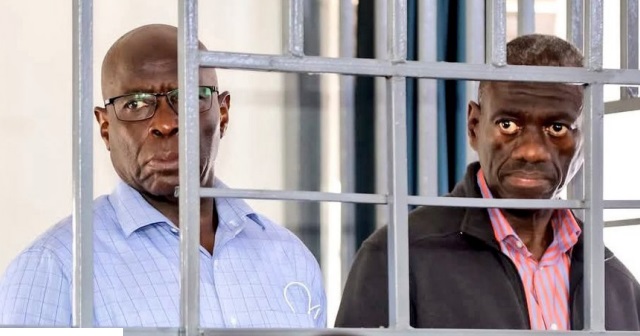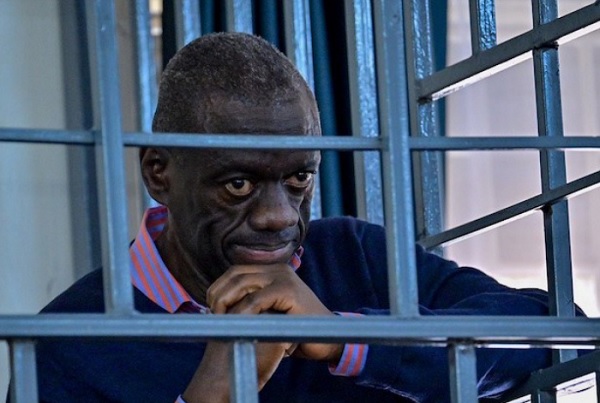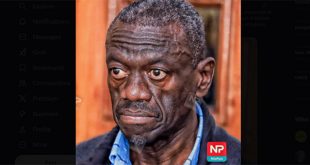
Why have they become a popular tool of repression?
COVER STORY | THE INDEPENDENT | The military court martial of the Uganda People’s Defence Forces (UPDF) that sits at Makindye in Kampala City has gained international notoriety for trying civilians.
International scrutiny of the court martial has intensified since it started trying Uganda’s most recognised opposition figure; retired Col. Dr Kizza Besigye.
Kizza Besigye and his two co-accused are battling charges of “treachery, illegal possession of a firearm, and solicitation of military support overseas in order to destabilise national security.” Besigye and his aide, Obeid Lutale, deny the charges.
The two were allegedly ‘kidnapped’ in the Kenyan capital, Nairobi, on November 21, 2024, at an apartment complex on Riverside Drive and whisked off under mysterious circumstances to stand trial in Kampala. Besigye was reportedly in Kenya for a book launch by Kenyan opposition politician, Martha Karua.
Besigye’s case has attracted widespread international attention because of the involvement among his defense team of Martha Karua who is a former minister of Justice of Kenya and long-standing member of parliament of Kenya. Added attention has also come because Besigye’s wife, Winnie Byanyima, is the head of UNAIDS, the Joint United Nations Programme on HIV/AIDS.
Initially, Besigye’s defense team had argued that, based on previous rulings by the Constitutional Court of Uganda, they were civilians who could not be tried under a military tribunal. They argued that the prosecution claims that the UPDF Act allows the military court martial to try civilians could not supersede the Constitutional provisions on civilian authority and fair trials.
Besigye’s defense team also argued that a military tribunal, composed of members of the UPDF, could provide a fair and impartial trial to civilians. They cited articles of the Uganda constitution which guarantee a fair hearing before an independent and impartial court.
Besigye’s lawyers; Martha Karua, Frederick Mpanga and Erias Lukwago had sought to have the Constitutional Court to address the issue of impartiality and independence of the UPDF Court Martial in trial of civilians.
They said they had questions for which they sought the Constitutional Court to determine, including whether, in light of the decisions of the Constitutional Court and the Supreme Court regarding the trial of civilians in the Court Martial, the conduct of the General Court Martial, as an organ of the UPDF and the members of UPDF who constitute it, is inconsistent with Article 208(2) which declares the UPDF and its members to be subordinate to civilian authority.
They wondered how justice could be dispensed for civilians in the Military Court Martial where the Defence Forces are the complainant, investigator, witnesses and judge. The team of Besigye lawyers asked the Court Martial to refer the case to the Constitutional Court for it to address those issues.
They also asked how the trial before the General Court Martial could proceed by judicial officers who have no professional training to execute and/or perform judicial functions as per Article 128 of the Constitution.
The court quashed the arguments and its chairman, Brig. Robert Freeman Mugabe, ruled that his court has the power to try anyone on the charges faces is accused of.
Museveni weighs in
President Yoweri Museveni, 80, has also defended the use of military courts to try civilians – despite the opposition following Besigye’s arrest. Museveni said any crime involving a gun was dealt with in a military court to ensure the country’s stability as civilian courts took too long to deal with cases.
“I have seen the arguments in the papers by some lawyers regarding the correctness of some civilians being tried in the Court Martial,” President Museveni said in a long post on X.
He said his National Resistance Movement (NRM) party had enacted a law through parliament in 2005 to allow the use of military courts because of the “rampant activities of criminals and terrorists that were using guns to kill people indiscriminately.”
“The civilian courts were clogged with the many court cases of the whole country: murders, rape, assaults, robbery, land matters, divorce matters etc, etc. They could, therefore, not handle these gun-wielding criminals quickly. Yet, for stabilization, you need speed,” he said.
The United Kingdom-based Amnesty International has called for Besigye’s release, saying his “abduction clearly violated international human rights law and the process of extradition with its requisite fair trial protections.”
United States-based Human Rights Watch said Besigye’s trial is “the latest example of Uganda’s authorities misusing military courts and military-related charges to clamp down on the opposition.”
But on Jan. 13 the prosecution successfully amended the charges to include Capt. Denis Ola, a serving officer in the Uganda People’s Defence Forces (UPDF) attached to the Armoured Brigade, who appeared in court in military uniform alongside the accused.
The Uganda case has once again resurrected debates for and against the trial of civilians in military courts. Two scholars, Brett J. Kyle and Andrew G. Reiter have previously weighed in on the subject.
Brett J. Kyle is Associate Professor of Political Science at the University of Nebraska at Omaha and Andrew G. Reiter is Associate Professor of Politics and International Relations at Mount Holyoke College. In 2021 they co-published a book titled ‘Military Courts, Civil-Military Relations, and the Legal Battle for Democracy: The Politics of Military Justice’ (Routledge).
According to them, military justice is a powerful, yet often overlooked, instrument of repression and impunity for human rights abuses. “Supporters of democracy and human rights should strongly challenge any expansion of military judicial power,” they say.
By definition, a court-martial is a military court or a trial conducted in such a court for members of the armed forces subject to military law. Generally, courts-martials are convened as ad hoc courts to try one or more cases referred by the convening authorities. This especially in times of war.
In a landmark ruling, the Supreme Court of Uganda in December 2024 ruled that military courts were inadvertently established as disciplinary mechanisms for active UPDF members.
In her ruling, Justice Lillian Tibatemwa-Ekirikubinza, the lead judge, said: “It appears to have been contemplated that the UPDF courts should hold soldiers accountable through a parallel judicial framework, distinct from the courts of judicature.”
But the Supreme Court is under pressure to issue a decision in another case—an appeal by the government challenging a Constitutional court ruling that declared the trial of civilians in military courts unconstitutional.
The case was heard in May 2024 and ruling should have been given already, especially in light of the ongoing cases of trial of civilian opposition figures in the Military Court Martial.
Previously, the Constitutional Court has held that civilians could not be tried in military courts, as doing so violated principles of judicial independence and fair trial enshrined in the Constitution.
The late Justice Keneth Kakuru’s ruling on the scope of the UPDF Act provided a detailed critique of the General Court Martial’s authority, emphasising its intended limitation to military matters alone. He argued that the Act, which establishes the court-martial, was never meant to have broad application beyond the military, and should not extend to trying civilians.
Military courts not a problem
According to scholars, Brett and Reiter, the existence of military courts is not a problem in itself. They argue that military codes of justice include unique crimes, such as desertion or being absent without official leave, that necessitate a separate judicial system.
But governments frequently extend the use of military courts well beyond their intent because, as they show in their research, as an effective way to shield members of the military from accountability and to prosecute civilian opponents.

Military and civilian codes of justice often overlap, with laws against assault and murder in both. Military courts can assert jurisdiction over cases involving their members. When that happens, the military controls the investigation and can hide evidence and intimidate witnesses. Unsurprisingly, impunity is common.
For example, in India, the Armed Forces Special Powers Act gives the army wide latitude in its domestic operations and provides it with the tools to evade accountability, even in cases of massacres of civilians, as recently took place in the state of Nagaland.
In Brazil, military courts judged the soldiers accused of killing two civilians in Rio de Janeiro in 2019, in accordance with a 2017 law that puts cases of military violence against civilians under military jurisdiction. The military insists on such legal protections as a condition for domestic deployment.
In November 2022, the Taliban government in Afghanistan announced the establishment of a military tribunal to enforce Sharia law. It was also to handle complaints against Taliban police, army, and intelligence units.
The developments in Afghanistan were not unique. Military courts have been a key feature of human rights abuses in India, Pakistan, Libya, Egypt, Tunisia, and many other countries.
“Why are regimes of all types increasingly turning to military courts as a tool of repression?” the scholars asked.
According to them, governments abuse the role of military courts by extending their jurisdiction to cover civilians, thereby allowing them to prosecute those opposed to their rule.
They wrote: “Tunisia regularly prosecutes civilians in military courts for “insulting the president.” In the Democratic Republic of the Congo, a military court convicted a musician for demoralizing the army. Lebanon has used military courts extensively to go after anti-government protestors. And in December, the Peshawar High Court in Pakistan and the Tunisian Court of Appeals sanctioned the use of military courts to try civilians.”
According to scholars, Brett and Reiter, the use of military courts is particularly common in countries that face internal security threats. Egypt recently gave military courts responsibility for prosecuting civilians accused of attacking important infrastructure, such as gas pipelines and railways.
Russia has used military courts to prosecute civilians accused of terrorism in Dagestan. Somali military courts play a prominent role in trying members of al-Shabab. Declarations of martial law or states of emergency typically grant the military even more sweeping judicial powers, as is seen in the southern region of Mindanao in the Philippines.
By shifting cases into the military justice system, governments are able to try individuals more quickly with lower thresholds of evidence and mete out harsher punishments. Libyan military courts, for example, have sentenced many civilians to death for criticizing the Libyan Arab Armed Forces.
Using military courts is also a way to keep cases out of the public eye. Most are not accessible to civilians, including the media. Even the US is in the process of building a second courtroom on Guantánamo Bay that will be closed to the public.
While the proceedings of these trials are often secret, their existence typically is not. International condemnation is thus widespread. The United Nations, African Commission on Human and Peoples’ Rights, and Inter-American Court of Human Rights, for example, have made it clear that military courts should not prosecute civilians. But these efforts have had little effect. In some cases, governments have outrightly ignored what are supposed to be binding rulings by international courts (e.g., Venezuela and Brazil).
As they show in their research, militaries staunchly resist reforms to their legal prerogatives. “They will fight to keep them long after they have given up control over their size, budgets, and missions. And politicians have little incentive to curtail the military’s legal power, especially when they face internal security threats.
“Weak civilian courts do not want to risk their own relevance by confronting politically influential militaries.”
Are there ways to counter the influence of military courts? Reform is most likely during major democratic transitions (e.g., Indonesia) and at the conclusion of civil wars (e.g., Mozambique and El Salvador). Absent in such openings, limiting the power of military courts requires sustained domestic resistance by a coalition of civil society actors and reform-minded politicians and judges.
Civil society organizations were able to pressure politicians to enact new legislation reining-in the power of military courts in South Korea, Taiwan, and the Dominican Republic. “Our research shows that domestic high courts are often the deciding factor in bringing about reform, but they require victims to continue to bring cases before them,”say the scholars.
“The most important lesson is to resist the domestic deployment of the military and the expansion of military justice in the first place. Even well-established democracies are quick to turn to military courts in times of crisis.”
The US, for example, used martial law extensively during the Civil War, resurrected the practice during World War II, and quickly reinterpreted the law to give military courts jurisdiction over suspected terrorists after 9/11. Recent deployments of the military and National Guard to police protests exposed loopholes in restrictions on their use. The heightened risk of political violence in the US today raises the prospect that leaders will continue to call on the military for such tasks, leading to jurisdictional clashes, with perilous consequences for the rule of law.
 The Independent Uganda: You get the Truth we Pay the Price
The Independent Uganda: You get the Truth we Pay the Price


